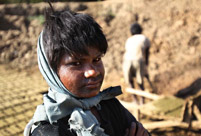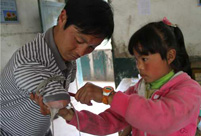TOKYO, Oct. 22 -- Japan for the first time has thrown its weight behind a UN statement on nuclear disarmament with senior government officials stating Tuesday that the humanitarian consequences of nuclear weapons use are unacceptable.
The statement was originally proposed by New Zealand and signed by Japan on Monday at the General Assembly's First Committee on disarmament.
The statement denounced the use of nuclear weapons under any circumstances and says that the very survival of humanity decrees that nuclear weapons must, without exception, never be used.
Japan's Foreign Minister Fumio Kishida said Tuesday that the government fully supports the statement as Japan is the only country to have experienced the atrocities caused by a nuclear attack.
"Japan understands firsthand the sheer horror of nuclear weapons and the survival of future generations is dependent on the irradiation of such weapons," Kishida told a press conference, referring to the 1945 atomic bombings of Hiroshima and Nagasaki toward the end of World War II.
Kishida's welcoming of the statement, similar statements of which up until now Japan has not signed, was in line with Prime Minister Shinzo Abe's stance on the issue, with Chief Cabinet Secretary Yoshihide Suga telling a news conference that the prime minister ardently believes in the realization of a world free of nuclear weapons.
Japan's failure to sign such pacts in the past, including the Nuclear Non-Proliferation Treaty proposed in April, was due to the government believing that previous statements ran contrary to Japan's security policy.
Japan's reliance on the U.S. nuclear deterrence was previously deemed to be at odds with prior non-proliferation and nuclear disarmament treaties, but following the Japanese government lobbying the assembly to reword the joint statement, officials here said that it is now acceptable to Japan and devoid of any contradictions.
The wording of the statement, according to government officials here, now takes into account countries looking to swiftly eradicate nuclear weapons entirely as well as countries looking to phase out such weapons over a period of time.
Japan's central government has been under pressure from the people of Hiroshima and Nagasaki to sign the latest statement, with Hiroshima Mayor Kazumi Matsui saying Tuesday he also welcomed the move.
Matsui said the central government finally shares the sentiments of the city's hopes for a nuclear-free world.
Similarly, Nagasaki Mayor Tomihisa Taue said the move was a positive step towards eradicating nuclear weapons and offers an opportunity for the Japanese government to be involved in a new united international security structure.
Taue also urged the central government here to take the lead in guiding other countries who have also endorsed the statement to ensure its realization.
August marked the 68th anniversary of the bombings of both Hiroshima and Nagasaki cities, which took the lives of as many as 166,000 people in Hiroshima and 80,000 people in Nagasaki, with half of the deaths in each city occurring on the first day the United States dropped the bombs.
Thousands more died from radiation sickness, burns and other injuries sustained by the atomic attack in the weeks, months and years that followed, according to official records.
 Low wages Indian migrant laborers
Low wages Indian migrant laborers Five fighters in flight training
Five fighters in flight training London mayor hails free trade, subway system on China tour
London mayor hails free trade, subway system on China tour Different eye catching shows at housing fairs in China
Different eye catching shows at housing fairs in China Chalk it up to great courage
Chalk it up to great courage Tibetan girl helps mobilize volunteers onlin
Tibetan girl helps mobilize volunteers onlin Lingerie show dazzles Wuhan Motor Show 2013
Lingerie show dazzles Wuhan Motor Show 2013  Chinese screen goddesses from Beijing Film Academy
Chinese screen goddesses from Beijing Film Academy  Weekly Sports Photos
Weekly Sports Photos Chinese riot police take Liberia peacekeeping mission
Chinese riot police take Liberia peacekeeping mission World has never been dark-- a blind kid’s life in Tibet
World has never been dark-- a blind kid’s life in Tibet Change to law may make it easier to sue polluters
Change to law may make it easier to sue polluters UNESCO world heritage site: Montale Tower
UNESCO world heritage site: Montale Tower U.S. Senate leader announces bipartisan deal
U.S. Senate leader announces bipartisan deal Fiber-optic wedding dress show shinning in Suzhou
Fiber-optic wedding dress show shinning in Suzhou Day|Week|Month